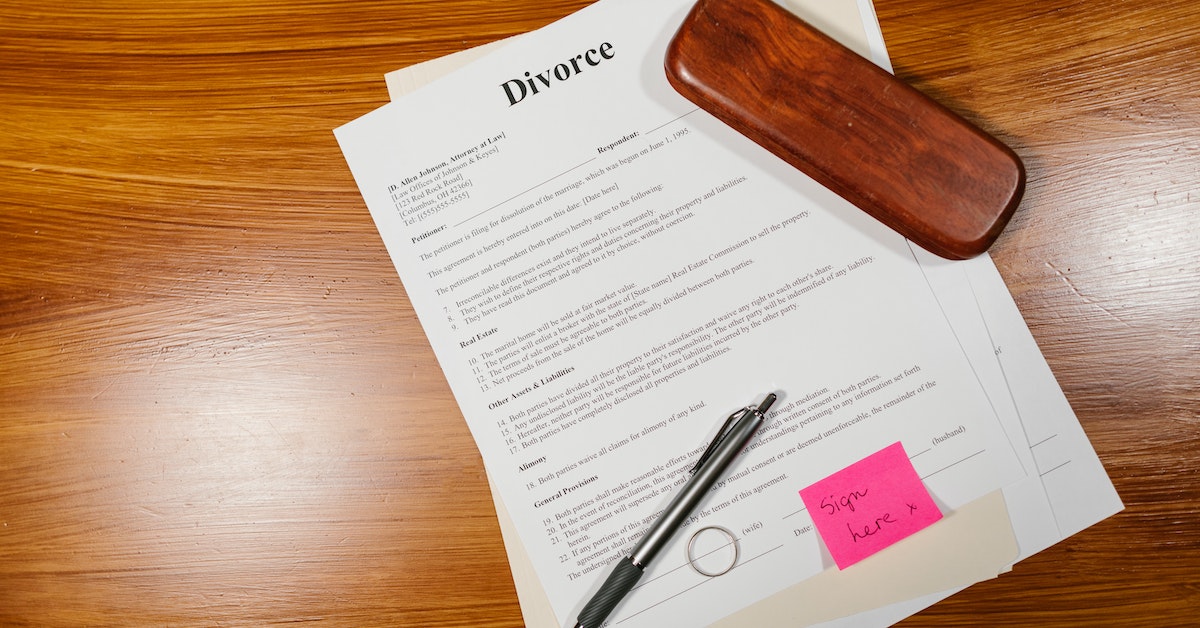Divorce can be an emotionally and physically draining experience for everyone involved, even when the couple arrives at an amicable and mutual decision to split up. Sometimes, the party that would normally be served divorce papers will choose to waive his or her right to be formally served to help reduce embarrassment and further distress. Before you sign this paperwork, however, there are a number of important things to understand about a divorce waiver of service in Texas.
One of the most important things to understand is that there are two different types of "waiver of service" forms that you can fill out as a part of a Texas divorce. One simply waives your right to be served but doesn’t impact your right to participate in the divorce proceedings. The other waives your right to be served and also waives your right to have any input in the divorce.
As you might imagine, making a mistake in this regard could be incredibly damaging. For this reason, it’s a good idea to fully understand the ramifications of signing a waiver of service in Texas. Because the stakes are so high, it’s generally a good idea to consult with a lawyer before signing a form of this type, as it is all too easy to sign the wrong form and give up more rights than you intended.
Let’s take a look at some of the most important things to understand about a divorce waiver of service in Texas to ensure that your rights are protected and your side of the story can be heard.
When an individual is being sued in Texas, they are entitled to what is known as personal service. This means that they receive a copy of the lawsuit that was filed with the county court.

You’ve likely heard about someone being “served” either in real life or in TV shows– this is the same thing as personal service.
If you’re spouse filed for divorce papers, it means that they filed a lawsuit against you and you will need to be served divorce papers.
The documents included in this paperwork are what is known as initial court papers. These typically include:
There are very specific parameters for how divorce papers must be served. Some of the aspects of the service might involve:
If you don’t want to get divorced and you don’t want to be served with divorce paperwork, you might now be thinking that you’ll simply refuse the documents if you’re approached by a process server or constable.
However, if those first two steps are accomplished and you refuse to take the paperwork, the process server is able to simply drop the documents on the ground. They can then go to the court and file an affidavit stating that you were served with your divorce paperwork but refused to receive it.
There are a number of different ways you can be served if your spouse is filing for divorce in Texas.

As the divorce process goes on, there will be more paperwork that gets filed over time. When the petitioner files paperwork after the initial filing, you will usually receive this information either through email or regular mail.
If you are served with divorce papers, the first thing you should do is read them immediately.

You’ll want to look out for a number of specific pieces of information, including:
The next step is calculating how long you have to file your answer.
Once you have been served with divorce paperwork, you are given a specific amount of time in which you can file an answer. It’s actually a little bit of a project to calculate your deadline, so you’ll want to pull up a calendar on your computer or head over to the calendar on your wall.

In order to figure out when your deadline is, you’ll want to first find the day that you were served.
From there, count out twenty more days, including holidays and weekends.
Now, go to the next Monday on the calendar.
This is your deadline– you must file an answer with the court before 10:am on or before this date (so long as any other waiting periods that are applicable to your case have passed.)
What do you do if the courts are closed on your answer deadline date? Look at your calendar and find the next day that the courts are open– your answer is due by then.
Being served with divorce papers can be overwhelming and confusing. Even if you don’t want to hire a lawyer to help you handle your entire divorce, you might find that consulting with a family law attorney about your options after being served is helpful.
Are you wondering if you're a good candidate for getting divorced without a lawyer in Texas? While it's fully within your rights to represent yourself in a Texas divorce, you'll want to weigh out the pros and cons of getting a DIY divorce before you decide to go it alone.
You ultimately have three primary options in terms of how to respond after being served with divorce papers.
An important note: if you think that the divorce should be transferred to another court in Texas or you don’t live in Texas, it’s essential that you talk to an attorney before filing an answer or forms of any kind with the court.
You have until the deadline you calculated above to file an answer with the court after you’ve been served with divorce papers. If you want to have a say in your divorce, you absolutely must file your answer by this deadline. The answer form is known as a Respondent’s Original Answer form.
If you don’t turn in your answer by the deadline, your spouse might be able to move forward with the divorce without any input from you at all.
Your second option is to file both an answer and a counter-petition with the court. When your spouse filed their divorce paperwork, they told the judge what orders they want to be made in your divorce. A counter-petition is your opportunity to tell the judge the orders that you would like to be made instead.
This might be the right option for you if your divorce is contested. If you are going through a contested divorce, it's generally advised to work with a lawyer.
Of course, you are also free to do absolutely nothing after you’ve been served with divorce papers. While this is a path you can take, it’s important to understand that there are consequences.
When you don’t respond, it doesn’t mean that you don’t have to get a divorce. What it means is that your spouse might be able to continue on in the divorce process without you.
This is what is known as a default judgment.
In short, you won’t have any say in what happens to your property, debt, and money. If you have children in the marriage, you won’t be able to have any say in what decisions are made regarding child support, visitation, and custody.
No one wants to be served papers for any type of lawsuit, but receiving divorce paperwork that is delivered in person by a process server or constable can be an uncomfortable and unpleasant experience. If you end up getting served in public or near your workplace, it can feel downright humiliating. If you know that your spouse is filing for divorce and you don’t want to be served, there are two options:
When you do one of these two things, you are communicating to the judge that you’ve received a file-stamped copy of the Original Petition for Divorce and that you ultimately know about the divorce case. When either of these things occur, your spouse won’t be required to have you served.
So we’ve talked quite a bit about your options when you are served with divorce papers, including filing an answer with the court to ensure that the divorce doesn’t carry on without your input.
But what exactly is an answer?
In short, an answer is a legal form that protects your right to have a say in your divorce. This form is filed by the respondent (the spouse that did not file the original divorce petition) with the court.
When you file an answer, you are ensuring that your spouse can’t finish the divorce unless you receive written notice of a contested hearing date or you agree to sign a Final Divorce Decree.
If the respondent knows about the divorce proceeding and doesn’t want to be sued, they can sign a waiver of service only form. In general, a waiver of service is a form that indicates that you are giving up your right to be served with divorce papers.
However, it is very important to understand that there are two different kinds of waivers of service forms, one of which waives your right to know anything about the case, meaning your spouse can complete the divorce without you being informed.
It isn’t particularly easy to tell the difference between the two different waiver forms. It’s a good idea to have a lawyer check over your paperwork before filing it with the court to ensure that you are filing the proper form. Otherwise, you could be giving up rights you don’t intend to.
In the next section, we’ll talk about what you need to know about the two different types of waiver of service forms.
Are you wondering what to expect during your divorce? You can learn more about the divorce process in Texas here.
If you are well aware that your spouse is filing for divorce, you aren’t interested in filing an answer or a counterpetition, and you’d prefer not to be served, you might be interested in signing a waiver of service. Before you do, though, read through these three things you’ll want to understand about a divorce waiver of service in Texas.
The first kind of waiver of service is known as a specific waiver. This is a form you can sign in order to waive your right to be formally served with the paperwork in a divorce case. When you fill out this type of waiver, you aren’t giving up any of your other rights in the case. Just as your right to participate in the divorce case is protected by filing an answer, so it is when you file the proper specific waiver form.
Your spouse will not be able to finish the divorce until you receive a contested hearing date or you agree to sign the final divorce decree if you file a specific waiver with the court.
Don’t just run off and sign the specific waiver without reading on, though. It is very important to read any waiver of service forms carefully before signing and filing them with the court. If you don’t, it’s possible you are signing and filing a form that gives up rights you don’t intend to waive.
There is also a waiver of service that is known as a global waiver. This type of form doesn’t just waive your right to be formally served with the divorce paperwork, but it also waives your right to receive any other information about the divorce case.
It is generally not a good idea to sign this type of waiver. When you sign and file a global waiver, you’re giving your spouse the right to complete the divorce without your involvement. This means that you won’t receive any notice when there are court dates, you won’t receive copies of the paperwork related to your divorce, and the judge won’t ever hear or incorporate your side of the story.
This means that a final decision about your divorce could be made without your consent. On top of that, your parental rights could be at stake if you have children through the marriage.
It isn’t always easy to tell the difference between these two types of waivers. If you are unsure whether you’re signing a specific or a global waiver, you might want to talk to a lawyer or choose to file a voluntary answer instead to make sure you aren’t waiving any rights you don’t intend to.
You should be very careful when downloading waiver of service forms online. If you want to sign a specific waiver, it’s best to talk to a lawyer or the courthouse about the proper form to fill out and file.
Receiving divorce papers can be incredibly unpleasant, and it makes sense that someone might want to avoid the experience altogether. However, it’s important that you don’t choose to sign a specific waiver of service without analyzing your other options as well. Unless you are 100% sure that you want to proceed with an agreed divorce, it’s really a good idea to consult with a lawyer to discuss the different courses of action you can take after your spouse files for divorce.
Beyond the fact that it might be better for you to file an answer
Whenever there is a civil case brought against another party in Texas, the opposing party must be formally served. While we often don’t think about divorces as lawsuits, they are technically civil suits.
If your spouse has filed for divorce, you might be wondering what to expect when it comes to being served.
The divorce paperwork will be hand-delivered to you by a process server, constable, or sheriff. This can be done at the place where you live but it can also occur at your work or somewhere else you frequently spend time. Once you have been served, the process server will provide proof of service to the courts.
Service can also come through certified mail in certain cases. If this is how you are served, you will need to sign the form and return the slip that is attached in order to show that you received this paperwork.
Are you wondering how you can keep your divorce affordable? This article looks at cheap divorce options in Texas.
Someone might choose to sign a waiver of service for a number of different reasons. Some of these include:
Signing a divorce waiver of service in Texas isn’t necessarily a bad idea, but you’ll want to be very certain that you are signing the right form and that you understand the implications of doing so. It is ultimately advisable to talk to a lawyer before you sign this type of form, even if the divorce is amicable and mutual.
If you’re getting divorced in Texas, the sheer amount of paperwork and decisions can be overwhelming. Not only are you dealing with the emotional and physical toll of dissolving your marriage, but you also have to navigate the complex legal process surrounding divorce in Texas.
One of the best things you can do when you’re getting divorced is read up on the laws in your state in order to better understand your rights and responsibilities. On top of that, informing yourself about the process of divorce and what to expect can help relieve stress and make you feel more on top of the ball. If you stay in the dark about how the process works, you can constantly feel like you’re getting blind-sighted by issues and circumstances you didn’t expect.
If you’re looking for more resources about family law in Texas, be sure to check out our library of articles at TexasDivorceLaws.org.